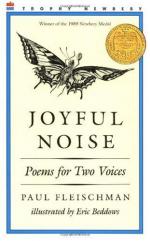
|
| Name: _________________________ | Period: ___________________ |
This quiz consists of 5 multiple choice and 5 short answer questions through Cicadas and Honeybees.
Multiple Choice Questions
1. Will the digger wasp ever see its offspring?
(a) Yes, but only for a short while.
(b) No.
(c) Yes, for several weeks.
(d) Yes, for their entire lives.
2. Why is the answer to number 90 repeated in the poem?
(a) This repetition shows how fast the boatmen must swim.
(b) This repetition is meant to annoy the reader.
(c) This repetition shows how important these insects are.
(d) This repetition creates the rhythm of the insects' oars as they slice through the water.
3. How do the reactions of other insects compare to others in history regarding this feat?
(a) Many people throughout history could walk on water.
(b) People are jealous of those who can walk on water.
(c) Only certain types of people can walk on water.
(d) Jesus' disciples were also shocked that Jesus could walk on water.
4. What words does the poet specifically use when he uses this literary device?
(a) The firefly lights up the entire night sky.
(b) Glimmering, gleaming, glowing.
(c) The light-hearted actions of the firefly is an allegory of spring.
(d) The firefly dances like the dancers in Degas' paintings.
5. For what else does the digger wasp prepare?
(a) A move to a new home.
(b) Additions to its family.
(c) Its death.
(d) The coming of winter.
Short Answer Questions
1. How does the poet help the reader relate to fireflies?
2. How is the letter F important in "Fireflies?"
3. How do the letters that are the answer to number 54 have emphasis placed on them?
4. From whose perspective is "Grasshoppers?"
5. It is interesting to see from the mayfly's perspective regarding what?
|
This section contains 382 words (approx. 2 pages at 300 words per page) |

|




